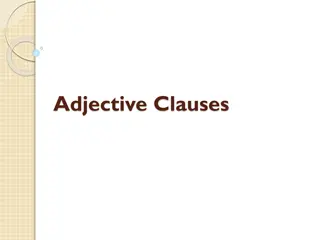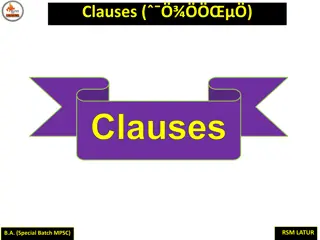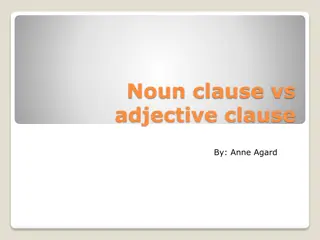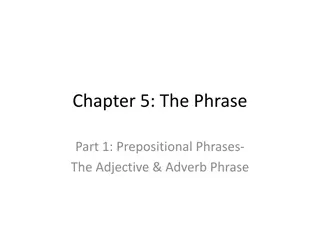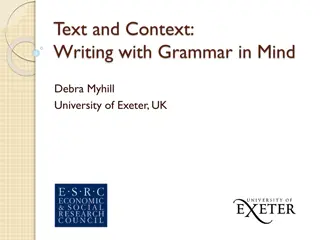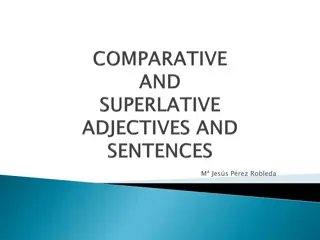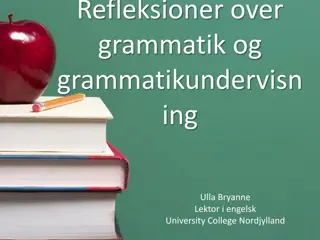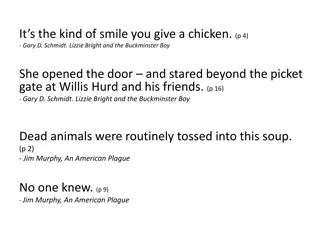Adjective Positions in English Grammar
The concepts of attributive and predicative adjectives in English grammar, their syntactic functions, and how adjective position can affect meaning. Learn about the differences between attributive and predicative adjectives through examples and explanations provided by language experts. Dive into the world of adjectives and enhance your understanding of their roles in constructing meaningful sentences.
Download Presentation

Please find below an Image/Link to download the presentation.
The content on the website is provided AS IS for your information and personal use only. It may not be sold, licensed, or shared on other websites without obtaining consent from the author.If you encounter any issues during the download, it is possible that the publisher has removed the file from their server.
You are allowed to download the files provided on this website for personal or commercial use, subject to the condition that they are used lawfully. All files are the property of their respective owners.
The content on the website is provided AS IS for your information and personal use only. It may not be sold, licensed, or shared on other websites without obtaining consent from the author.
E N D
Presentation Transcript
Definitions Chalker (1984:162) ,states that : " A traditional definition of an adjective is that it says what somebody or something is like ." This definition may be found in any traditional English grammar book, but Chalker has added that , modern grammar books prefer to define adjectives like other major word- class by " [ a ] position /function and [ b ] form / inflection. " In other words, they have a sortof descriptive meaning .
On the other hand , Crystal ( 1985: 26 - 27 ) , describes the term "attributive" as: "the term normally used to refer to the role of ADJECTIVES and NOUNS when they occur as MODIFIERS of the HEAD of noun PHRASE ."
Position Adjectives are usually called, according to their position, either attributive , predicative or post position . Our concern is attributive position , which is the most typical common position between a determiner and a noun . Thus adjectives in this position are called "attributive" because they attribute a quality or a characteristic to the noun . All those ------------ houses . We can put in this position such adjectives as old , attractive , charming , distinguished , etc . We have to note here that attributive only adjectives mean that the adjective precedes the noun , and however that does not mean that this noun phrase can not be positioned predicatively in a sentence : What you say is utter non sense . ( Chalker , 1984 : 162 )
On the other hand , a great number of adjectives can not be attributive adjectives and predicative adjectives at the same time as is shown in the following examples : The man was awake / * The awake man * The failure seems utter / An utter failure " Awake " can only be used as a predicative adjective not as attributive adjective , while , " utter " can only be used attributively and not predicatively . ( Tallerman , 1998 : 43 ) Now , sometimes , a change in the position of the adjective involves a change in meaning as is shown in the two examples below : involved style ( complicated ) people involved ( taking part ) . ( Aziz , 1989 : 288 )
Syntactic Function of Attributive Adjectives : Generally speaking , adjectives that are restricted to attributive position or occur predominately in attributive position do not characterize the referent of the noun directly, for example: ( 1.7 ) My old friend . ( 1.8 ) My friend is old . In example ( 1.7 ) , the adjective "old" means that ( one who has been a friend for a long time ) , here the adjective does not necessarily imply that my friend is old . In this case, we can not relate example ( 1.7 ) to example ( 1.8 ). Consequently ( 1.8 ) has a different meaning , because here "old" refers to the person while in the previous one , it refers to the relationship . The adjective "old" with this meaning is positioned attributively. ( Quirk , et al . , 1973 : 121 )
We have to mention here an important note , that in English , adjectives do not agree with the noun in number and gender as insome languages: She is a clever girl He is a clever boy They are clever boys and clever girls
Meaning and Position Adjectives , that normally occupy the attributive position , define anoun by permanent quality , so according to meaning they are called inherent adjectives : A kind person .
The attributive adjectives can be classified into classes according to meaning 1. Relationships as in : former , latter , order , upper . 2. Intensifying as in : sole , chief , very . 3. Limiting as in : sole , many . 4. Non related as in : chemical , solar . 5. Miscellaneous as in : indoor , outside , , up town .
6. Health adjectives , except ( poorly ) , can appear attributively and predicatively , but in British English , when they are attributive , they do not refer to health as in ;- A fine person , a better man . 7. Alternative past participle as in :- drunken , sunken . It is interesting to note that verbs with two forms for the past participle which are regular and irregular , usually take the irregular form to make the attributive adjectives . ( Chalker , 1984 : 166-168 ) , ( see also Quirk , et al , 1985 )
Adjectives are an open class with numerous semantic features and sub - groups such as ( color , terms of value , size , age , weight , etc .) . They attribute qualities or properties , and below we are going to discuss the most two important qualities .
Semantic Features Adjectives are an open class with numerous semantic features and sub - groups such as ( color , terms of value , size , age , weight , etc .) . They attribute qualities or properties , and below we are going to discuss the most two important qualities .
Stativity Most adjectives except for a small part of them share with nouns the same quality of being stativeaccording to meaning . Stativeadjectives mean that they describe permanent inherent qualities . Stative meaning is a quality especially associated with attributive adjectives when they occur as part of a noun phrase , as in the example below My old blue jacket
. Usually stativeadjectives must come with stativeverbs , as is shown below My jacket is old . *My jacket is being old . ( Chalker , 1984 : 163 ) These properties and qualities which are described as stative , are not subject to willful control as in the following example :- This man is tall. Either a person is tall or not , it is not possible to direct tall * She is being tall today .
Some other adjectives may be dynamic :- We are being very careful It is chiefly dynamic adjectives that can be made into adverbs by adding ly
Gradability Another semantic feature of adjectives including attributive adjectives , is gradability . This means that most adjectives can be put on a scale of intensity: old older oldest , or they attribute qualities or properties which are gradable in terms of less or more as in: more intelligent , less intelligent
Adjectives that are not inflected can not be gradable , thus we call such adjectives ; un gradable adjectives . Un gradable adjectives include such adjectives as : 1. Attributive only adjectives :former , outright , chemical , etc......... 2. Nationality adjectives : English , French , etc 3. Adjectives with absolute meaning : alternative , overage , equal , extra , etc .
Form 1.5 According to form , many adjectives have no characteristic form but some adjectives end in typical suffixes , such as :- able , ible , ish , full , less , or ous, which appear in words like desirable, contemptible , childish , helpful , helpless and dangerous respectively . Adjectives including attributive adjectives ,could be attached to two inflectional morphemes { er }, for comparative degree , and {-est } for superlative degree , and the base is called the positive degree .
Adjectives In Arabic In Arabic, the class of adjectives has always been considered as a subclass of noun. Grammarians usually distinguish between the two by calling the noun , ( a noun which is not an adjective ) , and the adjective , ( a noun which is adjective ).
There are four distinctions , we can recognize between the two classes in Arabic , but yet the similarities between the adjectives and nouns are greater than the differences . ( Aziz , 1985 : 159 ) If we take for an example the noun ( Adil - proper noun ( Adil ) or it may be an adjective ( fair ). This simple example shows the big similarity that exists between the two classes . , ( it may be a
Similarities between the Adjective and Noun in Arabic 1.Both adjectives and nouns take the definite article : - Man the man , Adil the fair 2. Both show gender :- An intelligent teacher (female) an intelligent teacher (masculine ) 2.Both show number :- Two intelligent men an intelligent man 3.Both show case contrast :- / / Man/men intelligent(singular)/intelligent(plural)
Differences between the Adjective and the Noun in Arabic , Now the main difference between these two classes is that those categories , mentioned previously : definiteness , number , gender and case are either selective, ( definiteness and case ) . Or inherent in categories , mentioned previously : definiteness , number , gender nouns , ( number and gender ) . In adjectives they are part of what is known as agreement or concord ,this means ,that they are subordinate to the nouns they modify and have to agree with them in number , gender , case ,and definiteness , or we can call them dependent adjectives , here the word " dependent " means that the adjective agrees with the properties of the head noun such as those mentioned before .
Position Adjectives in Arabic are positioned either attributively orpredicatively . Attributive adjectives normally in Arabic post modifythe noun head: - Attributive adjectives agree with nouns in definiteness , number , gender and case . The intelligent boy
Syntactic Function There are two basic functions which adjectives fulfill , known asthe attributive and predicative functions . Yazigi , ( 1985 : 95 ), says that attributive adjective is a descriptionfor a noun and is supposed to specify some of the noun qualities. We can distinguish two types of the adjective , real and reasonable attributive adjectives .
Real Attributive Adjectives Real adjectives follow the noun it modifies directly , and it has some conditions that control its uses , and those conditions are 1.The real adjective must agree with its noun in number , gender ,definiteness , or indefiniteness , and also parsed by the same way as its noun : The wise man is praiseworthy . - The devoted sons honor the compassionate parents . The real adjective may be one word , sentence or , quasisentence .( ibid )
Reasonable Attributive Adjectives They agree with the preceding noun in parsing , definiteness , indefiniteness , and qualify what follows and agree in gender with the preceding noun and sometimes agree in number father whose man a is This - ( is generous , his mother is virtuous and his parents are alive . manner is dispraised . We have to note here that in reasonable adjectives , what follows the adjective is parsed differently. So , ( subject of the adjective ( ( and ( acting subject for the adjective ) - ( I do not accompany a man whose ( in example , is the in example, is an (
Reference of the Attributive Adjective Wright ( 1974 , 283 : 2 ) , has explained that any adjective with avocative form expressed by the nominative , may likewise be put in the nominative or the accusative as in The intelligent Zeid Zeid the intelligent The adjective) ( , ( either directly , in which case , it is a simple adjective as in theexample below , ( may refer to the head noun There came to me a handsome man .
or indirectly in virtue of a following word which is connected with it as in : There came to me a man whose brother is handsome . In the latter case , the adjective called ( belong as a prefixed predicative to the following noun called ( the connecting , ( which is its subject and the two together form a or qualificative clause of the preceding substantive , with which the adjective agrees in case only by attraction -- the connected ) ,
In the following examples we can see , if the noun is in the dual or plural , the adjective is left in the singular as in I passed by two women whose parents are handsome . I passed by some men whose faces are handsome. On the other hand , the Arab grammarians acknowledge three classes of what they call ( ( followers and they are namely :-( the description or descriptive Word , qualificative adjective , the substitution ,or descriptive word . Sometimes , adjectives just as participles , might take after them arestrictive or limitative genitive as in : Handsome of face . Pure of heart .
Form As mentioned before , Arabic adjectives are similar to nouns in almost every aspect. Arabic adjectives are mainly derived from verbs . According to Aziz ( 1985 : 165 166 ) , the most common adjectives that are derived from verbs are :- : : : : / : / / Adjectives that are derived from nouns are formed by adding the suffix ( ( to the noun , as in the following examples
A Comparison of Attributive Adjectives in English and Arabic 3.1 Similarities 1. Attributive adjectives in English and Arabic are considered to be subordinate to the head noun . In Arabic this subordination is clear in that the adjective must agree with the noun head in number , gender , and definiteness. In English this subordination is implicit and not explicit . 2. Both in Arabic and English , attributive adjectives modify the noun . 3. Semantically speaking , both in English and Arabic attributive adjectives can be inherent , so they relate to the head directly as in old house or , indirectly , as in, old friend
4. Just like some Arabic adjectives which are derived from verbs , in English some adjectives are irregular forms of past participle verbs . 5. According to form , some English adjectives are formed byadding certain derivational suffixes to nouns and verbs , or they may be attached to certain inflectional suffixes . In Arabic they are also derived from certain verbs or nouns byadding the suffix( (.
. Differences 1. In English , they pre-modify the noun as in a clever boy In Arabic , attributive adjectives post modify the noun as in or , they pre modify what follows and agree only in gender and sometimes with number with the preceding noun , as in reasonable adjectives . I do not accompany a man whose manner is dispraised. 2. In English, attributive adjectives are related directly to the headnoun a tall man
while in Arabic , the attributive adjectives are related to the head in two ways : either directly as in Or indirectly as in : 3. . In English , Adjectives are a separate class of parts of speech ; while in Arabic adjectives are usually considered to be only as a sub class , because they are only a part of the class of nouns .
Many Thanks for your attention








